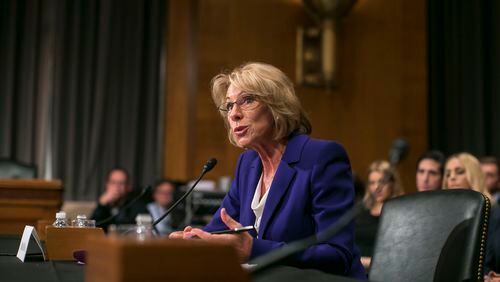Betsy DeVos, the most controversial and least experienced pick ever to lead the U.S. Department of Education, is expected to win easy confirmation Tuesday with the Republican Senate majority fully behind her.
As Education Week notes, DeVos is "at the center of a social media maelstrom and has stirred more opposition than any other candidate for secretary in the department's more than three decade history. Over the past couple of weeks, educators and activists concerned about her appointment have made thousands of calls to congressional offices and organized a spate of protests in Washington D.C., DeVos' hometown of Holland, Michigan, and elsewhere. Still, she'll probably be the next secretary of education. DeVos only needs Republican support to be confirmed. And the GOP controls the U.S. Senate 52 to 48. That means, if all the Democrats vote against DeVos as expected, three senators would need to flip to defeat her."
Her nomination has sparked a flood of calls, emails and letters; Georgia voters cannot even leave voicemail messages for their two U.S. senators because of the volume of anti-DeVos calls.
A petition by the grassroots activism network Credo Action collected 1.45 million signatures in opposition. "Ms. DeVos is wholly unfit to lead the department responsible for making sure all of our children have access to high-quality education," said Heidi Hess, campaign director for Credo Action.
Her lack of experience – the Michigan billionaire neither attended public schools nor sent her children to them and has pushed taxpayer-funded alternatives – is considered an asset. That DeVos has never held a job in the field is celebrated as a welcome alternative to pointy-headed experts who haven’t moved the needle.
That narrative overlooks some key truths. American students are doing better by many key measures, including high school attendance and graduation. It was not that long ago that half of the students in Georgia didn’t go onto high school; they left school after eighth grade to work in farms, mills and factories.
"By 1960, 42 percent of males, 25 years old and over [nationally], still had completed no more than the eighth grade, but 40 percent had completed high school and 10 percent had completed four years of college," according to the National Center for Education Statistics.
The problem is students now need education beyond high school and stronger math skills to thrive in a knowledge-based economy. That higher bar is tougher to reach, and schools with the hardest-to-educate kids are struggling. But DeVos' only solution is more choice, even bad ones.
She's invested her time and her husband's Amway fortune into making her home state of Michigan charter school friendly, embracing even the under-performing for-profit sector.
And what does Michigan have to show for her efforts, and what can the nation expect if DeVos expands those Michigan policies to all states?
Not excellence. Not by any measure.
Unlike New Orleans where there has been tighter control over charter schools, Michigan resisted accountability, in large part because DeVos fought it. Despite study after study finding for-profit operators produce the lowest-achieving schools, for-profits operate about 80 percent of charters in Michigan, more than in any other state.
And their guardian angel -- fighting regulations through political donations and clout-- has been DeVos, whose family invested in the omnipresent K12, which runs for-profit, virtual charter schools with a dismal track record in student performance.
(See the AJC investigation on Georgia Cyber Academy, a charter school here that pays K12 to provide technology and curriculum services, including $36.9 million in 2014-15. The AJC reported: The academy scored near the bottom in the state that year for "growth," a measure of how each student did on standardized state tests compared to others with similar past performance. The graduation rate of 66 percent lagged behind the state average by 13 percentage points. Reading ability in third grade, a key marker of future academic success, also lagged, with 47 percent of its students able to digest books on their grade level versus a state average of 52 percent.)
In an investigation into charter schools that examined two decades of records, the Detroit Free Press found:
And a record number of charter schools run by for-profit companies that rake in taxpayer money and refuse to detail how they spend it, saying they're private and not subject to disclosure laws. Michigan leads the nation in schools run by for-profits.
Michigan's laws are either nonexistent or so lenient that there are often no consequences for abuses or poor academics. Taxpayers and parents are left clueless about how charter schools spend the public's money, and lawmakers have resisted measures to close schools down for poor academic performance year after year.
Writing in The New York Times, Douglas N. Harris, a professor of economics at Tulane University and the founding director of the Education Research Alliance for New Orleans, wrote:
"The situation is not entirely Ms. DeVos's fault, of course, but she is widely seen as the main driver of the entire state's school overhaul. She devised Detroit's system to run like the Wild West. It's hardly a surprise that the system, which has almost no oversight, has failed. Schools there can do poorly and still continue to enroll students. Also, after more than a decade of Ms. DeVos's getting her way on a host of statewide education policies, Michigan has the dubious distinction of being one of five states with declining reading scores.
I understand the appeal of fresh ideas, but the public record proves DeVos' ideas have not helped students. Couldn't Donald Trump find someone who shared his education views but also offered a track record of success?
About the Author







